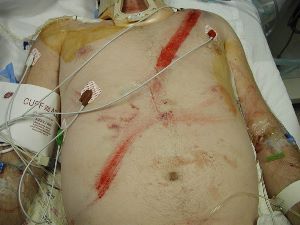We take for granted that the so-called seatbelt sign is a harbinger of bad things in the abdomen. One of the first papers on this topic appeared in the February 1990 issue of the Journal of Trauma, entitled “Intra-abdominal Seatbelt Injury.”
The paper presents 8 cases who presented to the ED with a seatbelt sign after a motor vehicle crash. They found that serious injuries to the bowel and mesentery might be present without early symptoms or physical signs, and that CT scan and peritoneal lavage were not fully reliable in finding the injuries. Their conclusion was that the always wise “high index of suspicion” should be used in these patients.
Current day thinking has not changed much. During the last two decades, sentiment has swung from always operating based on these finding to being more selective. We recommend using good judgment. Seatbelt sign should always arouse a healthy suspicion for injury. A CT scan is now mandatory. If anything unusual is found (free fluid, bowel wall or mesenteric thickening or stranding) then a trip to the OR is indicated. Small bowel injuries may not become symptomatic for 12-72 hours, increasing the eventual complication rate if treatment is delayed.


